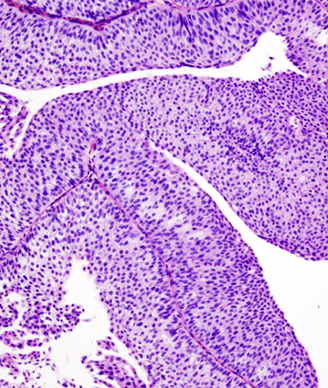Adjuvant Chemotherapy Improves Survival in Bladder Cancer
Patients with bladder cancer derived an overall survival benefit from the use of adjuvant chemotherapy compared with observation.
Histopathologic image of urothelial carcinoma of the bladder; source: KGH, Wikimedia Commons

Patients with bladder cancer derived an overall survival benefit from the use of adjuvant chemotherapy, according to the results of a retrospective study presented at the 2015 Genitourinary Cancers Symposium (Abstract 292).
“In this large population-based analysis, adjuvant chemotherapy was associated with improved overall survival,” said study presenter Matt D. Galsky, MD, of the Tisch Cancer Institute at Mount Sinai Hospital in New York. “Importantly, this is data from a real-world population, perhaps providing some insights into the effectiveness of this approach.”
According to Galsky, Level 1 evidence supports the use of neoadjuvant chemotherapy for the treatment of bladder cancer; however, trials exploring adjuvant chemotherapy have faced challenges, including the use of suboptimal chemotherapy regimens or methodological flaws. Three contemporary trials designed to compare observation with adjuvant chemotherapy in this patient population were closed early due to poor accrual.
In their study, Galsky and colleagues compared the efficacy of adjuvant chemotherapy (n = 1,293) with observation (n = 4,360) after radical cystectomy for locally advanced bladder cancer. The researchers used data derived from a de-identified National Cancer Data Base (NCDB) Participant User File. All patients had pathological T3 and/or node-positive disease without metastases. All patients in the observation group had to survive at least 30 days after cystectomy. Patients given adjuvant chemotherapy could receive multi-agent chemotherapy within 90 days of cystectomy.
The researchers calculated propensity scores defining a patient’s probability of being assigned to adjuvant chemotherapy compared with observation based on a variety of variables, including patient-level, facility-level, and tumor-level variables. Patients who received adjuvant chemotherapy were more likely to be younger, to have private insurance, to live in zip codes with a higher median income, and to have positive surgical margins, and were less likely to have multiple comorbidities.
The median follow-up for patients was about 6 years. The overall survival analysis showed that 36% of patients receiving adjuvant chemotherapy were alive at 5 years compared with 26% of patients undergoing observation. Hazard ratios (HRs) for overall survival with the use of adjuvant chemotherapy compared with observation showed consistent benefit for adjuvant chemotherapy:
- Cox model adjusted for propensity score: HR = 0.78 (95% confidence interval [CI], 0.71–0.86).
- Cox model weighted by the inverse probability of treatment: HR = 0.79 (95% CI, 0.75–0.83).
- Matched sample (Cox model stratified): HR = 0.69 (95% CI, 0.60–0.78).
Subset analyses showed that the use of adjuvant chemotherapy was favored in all subsets of patients, including those aged greater or less than 70 years, those with node-negative or node-positive disease, and those with greater or less than 15 nodes removed.
Galsky mentioned several limitations to the research, including the fact that the data are retrospective and that the NCDB lacks information on chemotherapy details and recurrence or cancer-specific survival data.